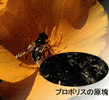
|

Traditional popularity as a natural antibiotic in East European countries.
|
Propolis, which is a mixed product with material that bees collect from pollens and tree barks, and a secretion of bees, has been traditionally utilized for years as a natural antibiotic and an anti-inflammatory or analgesic in Eastern European countries. The main production center is Brazil, and the form is a dark brown colored wax. At present, most propolis products in Japan are produced by an alcohol extraction method. The main effective component of propolis is a flavonoid, the effects of which are reported to be as follows.
1) Anti-inflammatory and pain-killing (analgesic) activity
2) Anti-true fungal activity
3) Anti-tumor activity
4) Anti-viral activity
5) Superoxide scavenging activity
6) Protective function for liver
7) Anti-diabetic activity
8) Prevention against radiation damage
9) Anti-asthma activity
10) Strengthening activity for blood vessels
Propolis has become been well known through a presentation at the 50th Annual Meeting of the Japanese Cancer Association, in 1991 in Japan. Propolis has been popular in Japan since the International Federation of Beekeepers' Association "Apimondia" held in Nagoya city in 1985. "Apimondia" was established as a place for exchange of information, and has over a 100 year history since the first meeting was held in 1897, in Brussels.

Concerning the effect of propolis, Mr. Tetsuya Matsuno, of the National Institute of Infectious Diseases, presented information that he found three anti-cancer agents such as diterpene from propolis, at the 50th Annual Meeting of the Japanese Cancer Association in September 1991. This led to a "propolis boom" in Japan. Then, research on propolis was extensively conducted in Japan, for instance, Hayashibara Co., Ltd. found significant effects such as macrophage activation and antibacterial activity in ethanolic extracts of propolis. Some 300 companies are selling propolis health foods and the market for it has been increasing steadily.

At present, Japanese propolis products are made from the Brazilian raw material by the alcohol, micelle, water, and supercritical methods of extraction.
|